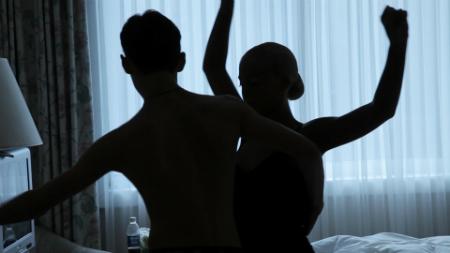"Dance for Me" started out with the director just putting one foot in front of the other, but she soon had to hustle to keep up with her story. The film was initially an assignment for a series of short films about young people in elite sport. Soon, however, there turned out to be a lot more to the story than that, and the film quickly grew into its present feature-length form of 80 minutes.
"I immediately sensed that they were a charismatic couple. When I asked about them, I was told that Egor had moved to Denmark not 10 days before. That opened up a story that went beyond dance."
Now, to Katrine Philp's delight and surprise, the film has made it into IDFA's competition for debut films. "It feels like we're still chasing the film, like it's in a hurry to grow and go places," the filmmaker smiles.
The ambition to be in constant motion is something the film shares with its characters. Like the director, they are at the start of their careers: Egor has moved from Russia to Denmark to form a couple on the dance floor with Mie, and he now lives with Mie and her family. The two teens ask a lot of themselves and each other. Being good is not enough, they want to be legends. Meanwhile, Egor is struggling to adjust to being so far away from home and staying with a strange family that speaks a language he doesn't understand.
Growing a facade
"I didn't want to leave, I just really wanted to dance," Egor volunteers in the opening of "Dance for Me". The film offers a window into the disciplined world of elite sport while showing what it's like to be a stranger – in a strange land and in a body that's growing from a boy into a man. It takes a lot of self-restraint for the 15-year-old not to show how sad he is and how much he misses his mother. He left her to come to Denmark to dance. It's part of the price he has to pay to become a perfect dancer.
"Egor absolutely does not have an easy time," Philp says. His story caught her eye when she first met the two young dancers.
She spotted Mie and Egor while casting in a ballroom full of dancers. "They were dancing way in the back and it felt like they didn't know each other that well. I could tell they were trying things out. I immediately sensed that they were a charismatic couple. When I asked about them, I was told that Egor had moved to Denmark not 10 days before. That opened up a story that went beyond dance: a story of the cost of striving for perfection. I had to seize it," Philp says.
"I was always interested in the process of moving towards flawlessness. So it was a good match for me to get a couple of dancers who hadn't reached perfection yet. Latin dance has to be so perfect, and very early in their careers dancers learn to handle the attention and be on the ball. They tend to grow a facade that can be hard to penetrate. Mie and Egor aren't perfect dancers yet, but they are training to get there – with all that involves emotionally. I think it's great that they are still so easy to read that you can see their emotions and how they haven't learned to control them yet."
Meeting people on their own terms
Philp is preoccupied with exploring what it's like for someone who is on shaky ground and trying to find an identity. She demonstrated that in her graduate film at the National Film School of Denmark, "Book of Miri", which tracks a Swedish loner who was adopted from Korea. That film, which was selected for IDFA's student competition, and "Dance for Me" both start from personal stories. While her next project Suitable – about a group of Burmese refugees applying to become so-called quota refugees in Denmark – has a broader political perspective, it, too, is a film that meets people on their own terms.
"I approach my films in pretty much the same way. Whether it's dancers or refugees, it's about meeting unique individuals. I always have a personal approach to my films," she says.
"To my mind, a good documentarian is open and curious. Trust is the most important thing. If you can offer your subjects the sincere interest you have inside of you, and not be pretentious or fake but open and ready to share something of yourself, people will let you into their lives. You have to create a space of trust and treat your participants properly and respectfully. I would never be able to make a film about someone I didn't like".
